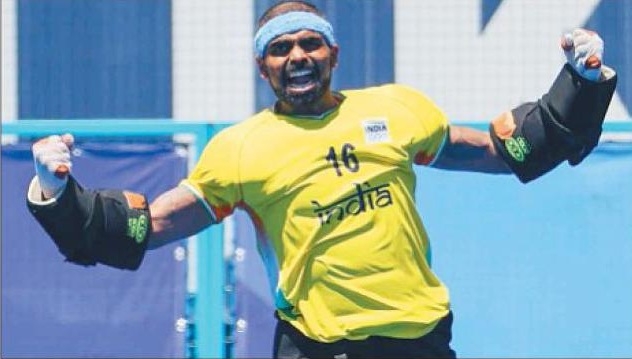Rekindling an old flame
| Date :08-Aug-2021 |

By RAHUL DIXIT ;
Romanticism never operates on the mechanics of objectivity. It blooms in a glow of delirium that a magical moment throws up with a sudden spurt. This nation of romantics experienced that moment in Tokyo when life tip-toed into an old flame to rekindle a love affair that India has had with the game of hockey. That intimacy is back with a Bronze! Love has blossomed, yet again. The Bronze medal Indian men’s hockey team has earned to end an excruciating pain of over four decades in Olympics has the potential to act as a fulcrum on which the game can regain its coveted position of being a national love. It is one affair that the country craves to revisit and reignite. The Tokyo thriller has put hockey on the path of redemption. It has come at the most opportune moment as the national game was seeking a way out of the dungeons of failure. The prisoners of an imposing history have finally broken free. Hockey is back - on front pages of newspapers, in the hearts of its lovers, possibly in family backyards where kids would indulge with stick-and-ball game for sheer pleasure, and most importantly in the collective consciousness of a nation that kept waiting eagerly for a turnaround.
All the adulation and encomiums being showered upon the Indian men and women’s hockey teams over the past few days speak of the emotional connect the country shares with the national game. Cricket may remain India’s biggest passion, but hockey will always be its first love. It stays in one corner of the heart, coming out in moments of tenderness, brightening the dark hours of melancholy, igniting the sepia-toned bliss of nostalgia. India has lived with this love with a classic panache. The relationship has hit a welcome refresh in Tokyo. The national celebration, which was a norm in the country once upon a time, provides a happy feeling that Indian hockey is ready to come out of past heartbreaks. The country endured it for 41 years since the 1980 Gold in Moscow became a millstone around the team’s neck. Many a stalwart, taking up the hockey stick, has carried the albatross all through these dark years. They searched for the lost glory but somehow ended up painfully short of their moment under the sun. They nursed dreams of replicating Dhyan Chand’s dribbling, Mohinder Pal Singh’s set-piece brilliance, Mohammad Shahid’s artistry, Zafar Iqbal’s polish.... they worked hard to match the legends, became stars in their own rights, took India to glory in various contests but somehow always tripped at the Olympic hurdle. Dhanraj Pillay held the flag aloft for years but could not fulfill the Olympic dream. Ashish Ballal guarded the citadel with the same courage that P R Sreejesh showed against Germany. Gagan Ajit Singh and Deepak Thakur mastered the art of reverse hits. Jugraj Singh and Sandeep Singh adorned the role of sharpshooters.
The list is long and worthy of every mention. But it also comes tagged with the failure in winning an Olympic medal. As the heartbreaks started growing, the eight Olympic Golds started waning into a memory to be relegated to one corner of the mind. The record feat kept coming out as a ready reference and a challenge to the Men in Blue after every four years. This remained the story of Indian hockey for last four decades till Manpreet Singh’s team scripted a golden story cast in the most lustrous Bronze. The losses had fuelled national apathy. They also created a thin layer of burnt-up national desire for winning while the ambers still lived on underneath. The Tokyo show has begun blowing off that ash of apathy. The Bronze medal by the men’s team and the fourth-place finish by the brave Indian women have healed an old wound. It deserves all the celebrations. The players deserve all the love and respect the country is showing.
The old flame has flickered into a bright glow. The change has come on the back of a massive correction in thinking by all the elements involved in making of the game. From power-hungry officials ruling the turf to a common platform where former Olympians worked on a long-term plan, Indian hockey has travelled a long distance. An ambitious programme like Target Olympics Podium Scheme (TOPS) was set in motion to create a talent pool. It was backed by Government funding and nurtured by the Sports Authority of India (SAI). A sense of national responsibility forced Hockey India to discard its ego-hunting selection policy. Support staff came in with a distinct vision. The revolving door through which national coaches ventured was finally brought to a stop. The players have also reciprocated to all these efforts with their performance. The Tokyo Bronze is not the ultimate product of the change, it is a starting point for Indian hockey. The Indian women’s team’s performance is also not a coincidence. It is a silent revolution which is yet to reach its consummation.
The bravehearts, who defied societal snub for women’s hockey, have stood against adversities and neglect in a sterling manner. Their close finish in Tokyo broke hearts but their will to fight has proved beyond doubt they have a bright future ahead. From being a footnote on the sports pages, the women have earned themselves headlines on the front pages. They have scripted a new narrative for the game. This giant leap is harbinger of a golden future for women’s hockey. Life is back in the national game. It is time to carry forward the resurgence. Hockey deserves it own place. The old flame deserves another radiant glow.